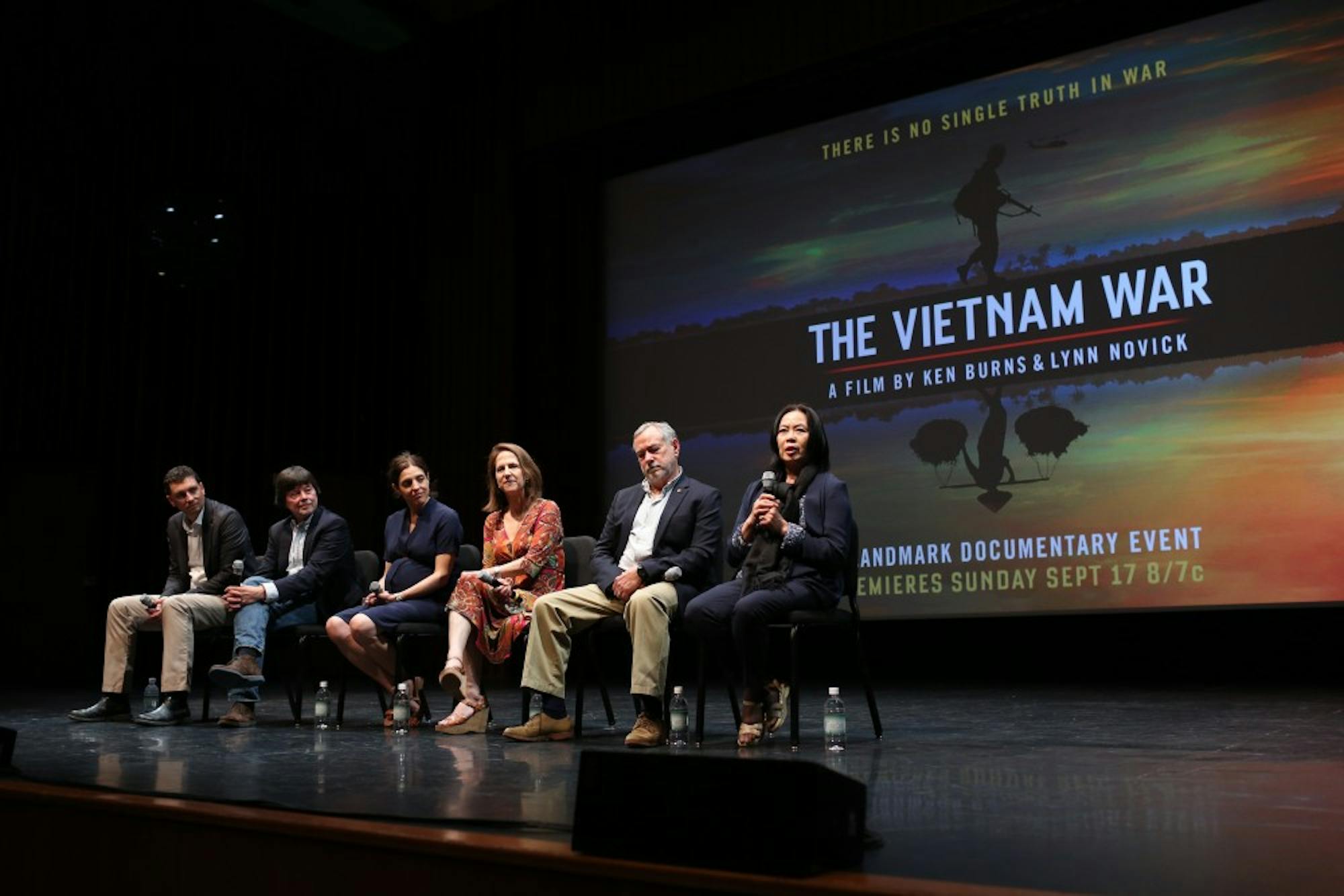The Vietnam War doesn’t fit neatly into American folklore. Unlike other American wars, it is not easily glorified. It cannot be summarized as “the good guys won, and the bad guys lost.” As a result, the war is one of the most emotionally charged and complex episodes in American history. Even though the last American soldiers left Saigon decades ago, one crucial fact was impressed on the audience in Spaulding Auditorium last Thursday night: the Vietnam War is as relevant today as it was 40 years ago.
On July 13, the Hopkins Center for the Performing Arts screened some clips from “The Vietnam War,” a documentary film directed by Ken Burns and Lynn Novick. The directors themselves sat on a panel following the screening, joined by two interviewees who appeared in the film. Spaulding Auditorium was full to standing room.
To us, the crowd looked like most crowds at Dartmouth-sponsored lectures: faculty, some interested students, some not-so-interested students and a lot of retirees. It seemed like a normal crowd, until Burns asked all those who had served in the Vietnam War to rise for recognition. Around 50 men and women stood up. Two rose to their feet right in front of us. These two men could have stood in front of us in line at Dirt Cowboy or walked past us on the Green, and we wouldn’t have batted an eye. And yet here they were, a living testament to the Vietnam War.
This fact was not coincidental. A large portion of Burns and Novick’s documentary is dedicated to revising the notion that Vietnam is a bygone war in a bygone era. The fighting has stopped, but Burns and Novick’s film shows that the conflict is very much still present in American and Vietnamese psyches.
This is not an informational documentary in the classic sense. The voice-over narration takes a significant backseat to the interviews of those who lived through the war. The film prioritizes color over chronology, individuality over generalizations. The bulk of the preview played on Thursday night was comprised of interviews of American and Vietnamese veterans and civilians. Each interview was a subjective retelling of history. It was the Vietnam War through that specific person’s eyes. However, by showcasing so many individual experiences, Burns and Novick find some of the objective narrative of the war.
This narrative is not what you’d expect. In the U.S., memory of the Vietnam War tends to focus exclusively on the American experience. The film delves poignantly into that experience, but it also challenges the U.S.-centered perception of the war.
“What I think sets this documentary apart [from other works on the Vietnam War] is the number and variety of Vietnamese voices and perspectives,” commented history professor Edward Miller, who advised Burns on the documentary. This was a conscious effort: the filmmakers spent months in Vietnam, conducting interviews that appear throughout the film.
The result is that this documentary stands out from its peers, boldly challenging how popular culture depicts the war. Whether in print journalism, “Forrest Gump” or “Apocalypse Now,” previous representations of the Vietnam War have followed an almost Manichaean logic: good versus evil, communist versus democrat. Burns and Novick bring the focus back to the individual. Each perspective shared in the film is given validity, whether from a U.S. soldier, Viet Cong or civilian from either country. By including Vietnamese experiences, the film questions the traditional dichotomous view of the war and the current understanding of the conflict.
The film has another important message: inter-societal healing.
“I think all of us who worked on it are hopeful that it will allow Americans with diverse and divergent memories of the war to share their experiences with each other,” Miller said.
Both in Vietnam and in the U.S., ideological turmoil lives on. The opening thesis of the documentary is that the war was followed by silence, in which societal cleavages were not addressed. Now, viewers can listen to a multiplicity of opinions and experiences: American, Vietnamese, pro-war, pacifist.
Last Thursday, veterans and protesters had their perspectives validated, heard and respected. Hopefully, they did the same to differing perspectives. This is why this documentary promises an extraordinary impact. It reopens a conversation that will result in a newer and more nuanced understanding of the Vietnam War, the effects of which are still ricocheting around society today.
Rating: 9/10




